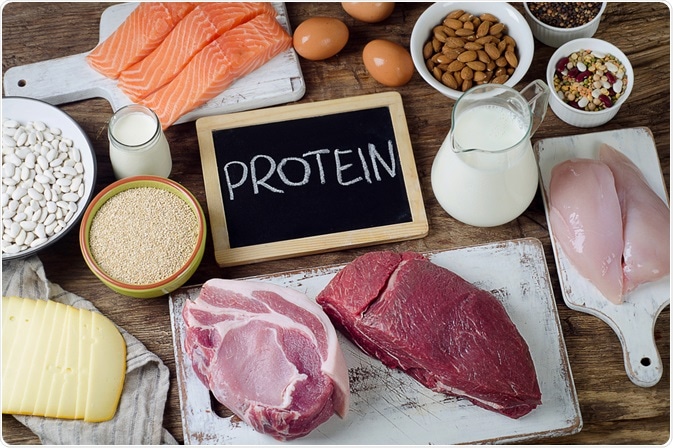What is protein and why is it important?
Proteins are essential in order for the human body to function. Proteins are the functional result of gene expression and are important constituents of life such as; cells, antibodies, enzymes, and hormones.

Image Credit: Bitt24/Shutterstock.com
Proteins modulate essential chemical reactions, messenger proteins transmit signals throughout the body, proteins function as structural building blocks to form the shape of cells and as transport and storage vessels that carry molecules around the body, they are essential to numerous vital functions of the human body.
Around 10 to 15% of our dietary energy is provided by protein, and it is the second most abundant substance found in the body. Mostly protein is found in the muscle, but it is also present at high levels in the skin and blood.
The benefits of high protein diets
High protein diets are becoming more popular due to the perceived health benefits. A high protein diet may provide a greater feeling of satiety when attempting to lose weight and may be used for building muscle during training. Some studies even recommend high protein diets to help the body heal after trauma, such as a burns.
Therefore, there are many reasons why people need significant amounts of protein in their diet, however, many studies and personal experiences of high protein diets are noting a link between elevated levels of protein and bloating.
Bloating as a side effect of high protein diets
It is estimated that around 1g of protein per 1kg of a person’s body weight should be consumed each day to maintain health.
A recent study revealed that this recommendation of 1g of protein per 1kg of body weight is the minimum requirement, suited to those with minimum activity levels.
For moderately active people, 1.3g should be eaten for each 1kg of body weight, and a total of 1.6g per 1kg should be eaten by those with intense activity levels.
In special cases, even more, protein may be required to sustain the body, such as in the case of elite athletes who may need as much as 3.5g of protein per 1kg of body weight.
While consuming enough protein is essential to maintaining health, consuming extra may cause uncomfortable bloating. Many high protein products, such as shakes, bars, and wholegrain foods also contain high amounts of sugar and added fiber, which induces bloating.
Chicory root is often added into protein bars, which contains high levels of fiber and drinking shakes often leads to swallowing air, which may cause bloating.
Lactose can also be a culprit of protein-related bloating. Research estimates that between 30 to 50 million people in the US have lactose intolerance and it is thought that a large portion of these people are unaware of their intolerance.
Whey protein powder often contains lactose, some may experience bloating as a result of intolerance to the substance.
Finally, numerous vegetarian and vegan sources of protein such as; soy, beans, and lentils can lead to bloating because they contain oligosaccharides, a form of difficult to digest sugars, these are broken down by bacteria within the large intestine that produce gas via the fermentation of the oligosaccharides.
Avoiding protein-related bloating
Overall, the protein itself is unlikely to cause bloating, other substances within high protein foods are related to bloating, such as fiber, sugars, oligosaccharides, and even lactose that cause intolerance issues in some people.
To avoid this side effect of a high protein diet, food products such as fish, chicken, eggs, and red meat should be the primary source of protein.
Increased red meat consumption should be carefully considered as overconsumption has been associated with negative health impacts.
References:
- Barrett, J. S., & Gibson, P. R. (2012). Fermentable oligosaccharides, disaccharides, monosaccharides, and polyols (FODMAPs) and nonallergic food intolerance: FODMAPs or food chemicals?. Therapeutic advances in gastroenterology, 5(4), 261-268.
- MacKay, D. J., & Miller, A. L. (2003). Nutritional support for wound healing. Alternative medicine review, 8(4).
- Wolfe, R. R. (2000). Protein supplements and exercise. The American journal of clinical nutrition, 72(2), 551S-557S.
- Wu, G. (2016). Dietary protein intake and human health. Food & Function, 7(3), pp.1251-1265.
Further Reading
Last Updated: Feb 24, 2020